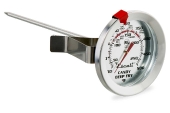
 3
3




Donna Lynn wrote:If you just want to be able to be gone from home for a few days or so, and you don't want to fill your drain traps with anti-freeze or other toxic gunk, plain ol' 80 proof or higher booze can be poured into the drain to displace most of the water. No taking anything apart or trying to blow air through. Same with toilet bowls. 80 proof alcohol has an approx. freezing temp of -17 degrees F. So mixed with a bit of water left in a drain trap it might not protect quite that low, but still WAYYY better than 32 degrees F! Just keep a few bottles of super cheap vodka or whatever on hand and you'll only be putting food-safe liquids down into your septic tank and field. (A caveat is that long term exposure to alcohol may affect PVC plastics, so if anyone plans to use this method long term, do your due diligence on your plumbing system vs. your alcohol type vs. how much water would be mixed with the alcohol in the traps.) I'm not an auto person, but don't they make little squeeze-bulb tubes with different colored plastic balls inside that float or sink at different dilutions of anti-freeze? Could that kind of thing be used or re-imagined for use with alcohol/water solutions to tell what temp it would freeze at? That way you could test each trap to be sure you have enough alcohol in it for the temps you are expecting during your absence, at least until you get the hang of how much to pour down each drain or toilet bowl.
For supply lines, I would install one or more drain valves at low point(s) and open a faucet at a high point(s) and just drain out as much as possible into a bucket which can be used to water plants or whatever.
If you do a search on freezing points of natural liquids, and check out more than just the top few, you may even find something that would work better than cheap booze! I keep Costco bottles of vodka onhand for herbal tincturing, and they are fairly cheap. So if I had to winterize temporarily I would not hesitate to use that to protect a toilet or drain traps from freezing temps. We have both PVC and cast iron drain lines and standard porcelain toilets. Copper supply lines that can be drained down to the basement. But we do not have frequent needs to be gone for days at a time in winter.
If anyone knows of any reason NOT to use vodka (or other cheap booze 80 proof or higher) for this purpose, please share!
 3
3




 1
1




David Baillie wrote:
I think I would stick to the RV type I use now. At less than 10 dollars a gallon it's much cheaper and it's a blend of ethanol and food grade propylene glycol (used as a food additive). I wouldn't want to drink the stuff but it's labelled as septic safe and is not supposed to be consumed anyways but flushed out after melt. The glycol role is not to keep it from freezing but to make it freeze like a slushy so it doesn't break anything. I have heard concentrated alcohol will affect certain seals in plumbing such as rubber gaskets. I know alcohol in engines used to disolve rubber fuel lines.
De-fund the Mosquito Police!
Become extra-civilized...
 3
3




As long as the water moves, it won't freeze.
 2
2




Coydon Wallham wrote:I've seen that at freezer temps (-12F?), 7% cider will have much of the water freeze, but the alcohol will still pour off in a slushy concoction (known as fractionally freezing). My guess is that a 40% alcohol product would be more than enough to prevent an ice block from forming until it was to approach -170*F.
 2
2




Douglas Alpenstock wrote:
Haha, true, freeze distillation of booze has been used for centuries. I had some dodgy homemade wine once and tried it. I seem to recall that the ice formed a pretty solid block. (And the wine was more boozy, but still dodgy.)
De-fund the Mosquito Police!
Become extra-civilized...








Explore the Permies Digital Market - ebooks, movies, building plans, courses, and more. Oh my!



|
Blood pressure normal? What do I change to get "magnificent"? Maybe this tiny ad?
Learn Permaculture through a little hard work
https://wheaton-labs.com/bootcamp
|







